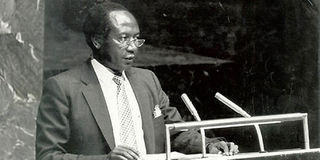Robert Ouko murder: Fear still stalks Koru, 29 years later

Kenya's minister for Foreign Affairs Dr Robert Ouko addressing the 37th session of the UN General Assembly in New York on October 6, 1982. Photo/FILE
What you need to know:
- The murder of Foreign Affairs Minister Robert Ouko on February 13, 1990 is still fresh in many people’s minds.
And the subsequent events following the killing that have seen key witnesses die mysteriously, adding to the villagers’ fears.
Few are willing to discuss the topic freely.
Almost three decades have passed, reports published and forgotten. but villagers in Koru are still shaken.
Their fear is written on their faces 29 years later.
FEBRUARY 13
The murder of Foreign Affairs Minister Robert Ouko on February 13, 1990 is still fresh in many people’s minds.
And the subsequent events following the killing that have seen key witnesses die mysteriously, adding to the villagers’ fears.
Few are willing to discuss the topic freely.
As we drive into the village in Muhoroni, Kisumu County, children who were not born when the minister was killed give the car a chase.
We approach Got Alila where Dr Ouko’s charred remains were found.
Unlike the children, adults shy away, some vanish into the bushes or their houses while others only watch from a distance.
Our presence is obviously a cause of concern around the homesteads at the foot of Got Alila, just three kilometres from the Ouko home.
The road in the hilly area is dusty and the vegetation dry. River Nyando provides the much needed water for locals.
We bump into two villagers — Esau Omollo and Joe Were.
After a brief talk, an uneasy Omollo agrees to take us to the spot Dr Ouko’s body was found by Paul Shikuku, a herdsboy.
CHURCH SERVICE
We walk through overgrown shrubs to the rocky point.
A metal rod stands at the exact spot the charred remains were found.
Mr Omollo says he was barely 10 years old when Dr Ouko was murdered.
We attempt to persuade him to take us to Shikuku’s home for an interview but our efforts are in vain.
The topic seems to unnerve all.
The Shikuku family home is across the river in Ainamoi, Kericho County.
Mr Omollo says Dr Ouko might have known he was going to die.
“On Sunday February 11, 1990, the minister attended a church service at AIC Koru and he asked to address the congregation,” Mr Omollo said.
“He opened the Bible and read Job 7:1-14. There was silence in the church. The minister occasionally stopped reading and wiped tears from his eyes.”

Koru residents show the Daily Nation team the spot where Dr Robert Ouko’s charred remains were found at Got Alila. PHOTO | ONDARI OGEGA | NATION
Job 7 reads: “Human life is like forced army service, like a life of hard manual labour, like a slave longing for cool shade; like a worker waiting to be paid...When I lie down to sleep, the hours drag. I toss all night and long for dawn...My body is full of worms. It is covered with scabs. Pus runs out of my sores...Remember, O God, my life is only a breath; my happiness has already ended.”
Mr Were says villagers have not forgotten the death.
“A lot of water has passed under the bridge but we leave it all to God,” he says.
Three days after the church service, Shikuku found the minister’s body.
“There was a can, a pen, spectacles, a walking stick, a torch and a pistol next to the body. The can, we later heard, contained acid. The face was almost unidentifiable,” Mr Were said.
Mr Omollo says security teams would visit Koru day and night sending many in panic.
'KILLERS KNOWN'
Former Kisumu Town East MP Gor Sungu, who in 2013 chaired a parliamentary team that investigated the death, told the Nation on Monday that Dr Ouko’s killers are known.
He was, however, guarded with information.
“Some killers have died. This information is in the Hansard. We tabled the report but was never discussed in Parliament,” Mr Sungu said.
“One of the achievements of the committee is that the evidence it presented is preserved. All the files are kept in Parliament.”
He recalled how members of the committee flew to London, the UK and interviewed Scotland Yard detective John Troon, who was called in by President Daniel arap Moi in the 1990s to lead investigations into the killing of the Foreign Affairs minister.
“We took the details and the records are available. We even got the work tickets of the vehicles used and have the names of the individuals in those records,” Mr Sungu added.
He blames past regimes for “frustrating our efforts”.
He said his committee did everything possible to unravel the mystery surrounding Dr Ouko’s death.
Mr Sungu said the matter could still be pursued and the killers brought to book.
'PEDDLING RUMOURS'
The country witnessed riots following the death of Foreign Affairs minister Robert Ouko.
Months later, President Daniel arap Moi formed a commission of inquiry to look into the murder. It was led by Justice Evans Gicheru. The commission, which sat for 13 months, took statements from 176 witnesses and had almost 250 sessions.
Among the people mentioned as suspects were Industry Minister Nicholas Biwott, PS in the Office of the President Hezekiah Oyuki and Mr Jonah Anguka, the Nakuru District Commissioner.
President Moi would later disband the commission, accusing the witnesses of peddling rumours.
“There is no statute of limitations when it comes to murder. The cases can be pursued even when perpetrators die. Elderly people have been prosecuted for crimes they committed in the past. An example is Chilean former president Augusto Pinochet,” said Mr Sungu, adding that had Dr Ouko gone public with threats on his life, the killers would probably have spared him.





